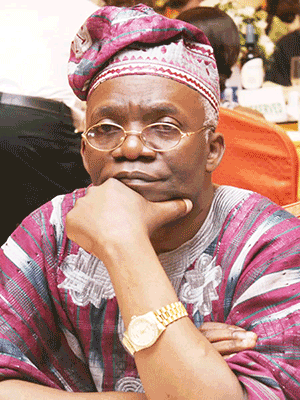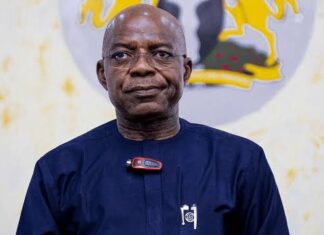Following the agenda on challenge of political restructuring in the country, Assistant Politics Editor, DANIEL KANU, takes another look at the proposal of the just-concluded national conference for more states…
It is common knowledge that the clamour for creation of new states is instigated by the monthly handouts existing states run cap-in-hand to Abuja to collect. It is not about development as touted by the proponents.
Femi Falana
However, as presently constituted, some of the existing states are not economically viable – they cannot survive without the chicken pea from the centre every month; hence the need for state merging.
In this vein, the conference resolved that a referendum should be conducted in each of the states that wants to merge, with 65 per cent of the eligible voters in the state approving the merger, and the National Assembly, by resolutions, approving the merger.
The new states are expected to be shared among the six geo-political zones of the country. However, the conference also approved the creation of one more state for the South East, which is going to be different from the 18 new states.
The new state for the South East was based on the fact that out of the six zones in the country, only the zone has five states, while others, except North West which has seven states, have six states.
With the latest development, it appears that respite is on the way for the South East zone on its cry over the years for another state.
Going by the confab deliberations, some of the proposed states are expected to be carved out as follows: Aba from the present Abia State, Katagum (from Bauchi), Ijebu (Ogun), Amana (former Sardauna Province), Apa (Benue), Anioma (Delta), Savannah (Borno), Etiti (South East), Njaba/Anim (Anambra and Imo), Gurara (Kaduna), Ghari (Kano), Adada (Enugu), New Oyo (Oyo), Orachi (Rivers), Ogoja (Cross River) and Kanji from Kebbi and Niger states.
The two states from both the South South and South West would be determined later.
Before and after Independence in 1960, Nigeria was a federation of three regions: Northern, Western, and Eastern. Provinces were also used in colonial times. In 1963, two provinces were detached from the Western Region to form the new Mid-Western Region. In 1967, the regions were replaced by 12 states due to a military decree by then military leader, Gen. Yakubu Gowon; only the former Mid-Western Region escaped division, and formed a single state following the restructuring.
From 1967 to 1970, the areas of Mid-Western State and the Eastern Region attempted to secede as Biafra, as a result of claims of marginalisation.
In 1976, during the era of Murtala Mohammed/Olusegun Obasanjo, seven new states were created, making 19 altogether.
In 1987, two new states were established, followed by another nine in 1991, bringing the total to 30. Also, the Federal Capital Territory (FCT), Abuja, was established in 1991.
The latest change, in 1996, resulted in the present number of 36 states.
It is obvious the position would elicit mixed reaction.
For instance, elderstatesman, Yahaya Kwande, told TheNiche in a telephone interview that creating more states was not the Nigerian problem, but the motive behind such moves.
The former ambassador to Switzerland said there must be criteria to qualify creation of a state, arguing that he would only advocate for just one more state for the South East zone, to place it at par with the other four geo-political zones.
Said Kwande: “Creating of more states is not the solution to Nigeria’s problem. You can create 1,000 states and nothing will change for the better. Some of the reasons being adduced are selfish sentiments of individuals, some are tribal differences, some are cultural and religious differences; but above all, there must be a format whether the area qualifies for a state or not.
“If I must give you my candid opinion, I think it is only the South East that deserves one more state so as to be at par with the other geo-political zones. In creating a state, you look at many criteria: land area, population and other peculiarities. We can create, let’s say, Mambila state, due to its peculiarity of no road, no water etc; but saying we want to create more 18 states with no format, no criteria is not the solution. It is only the South East that deserves additional state.”
A delegate to the conference who is also a Senior Advocate of Nigeria (SAN), Femi Falana, condemned the decision to create more states. He said the action was at variance with the decisions and resolutions earlier taken by the conference on the need by government to cut cost.
“Having regard to the several resolutions of the national conference on the need to reduce the costs of governance, I found the recommendation for the creation of additional 18 states rather contradictory,” Falana said.
National deputy chairman of the All Progressives Grand Alliance (APGA), South West, Tayo Sowunmi, said it would be a healthy development to give the South East additional state on grounds of fairness and equity.
He is of the opinion that the clamour for more states is misplaced, insisting that most states in the country today were unable to generate any meaningful revenue internally.
“Creation of state is not the major issue plaguing the country today; but I think it will be a healthy development to create an additional state for the South East. South East zone has been neglected over the years, if truth must be told. So it is the only zone I think that needs additional state, so as to have a level playing field and equity in the system,” he said.
Part of the major reason for the clamour of states is quite simple: it is through the states and its number of local governments that revenue allocation from the federation account is disbursed.
Also the states determine number of federal representations both at the National Assembly and federal appointments.
It is for this reason that the South East zone has continued to raise its voice, insisting that the situation must be redresed.
The lacuna in state creation is that it is only the military that can create states with ease, given the Nigerian situation. It has been constitutionally difficult to create a state in a democracy.
Given the Nigerian constitution, both the National Assembly and at least 24 Houses of Assembly in the country must vote in favour of a state to be created. This has made it nearly impossible.
Political analysts say the realisation of the new states can only be made easier if a referendum is adopted. For now, it is not yet uhuru for the South East.











